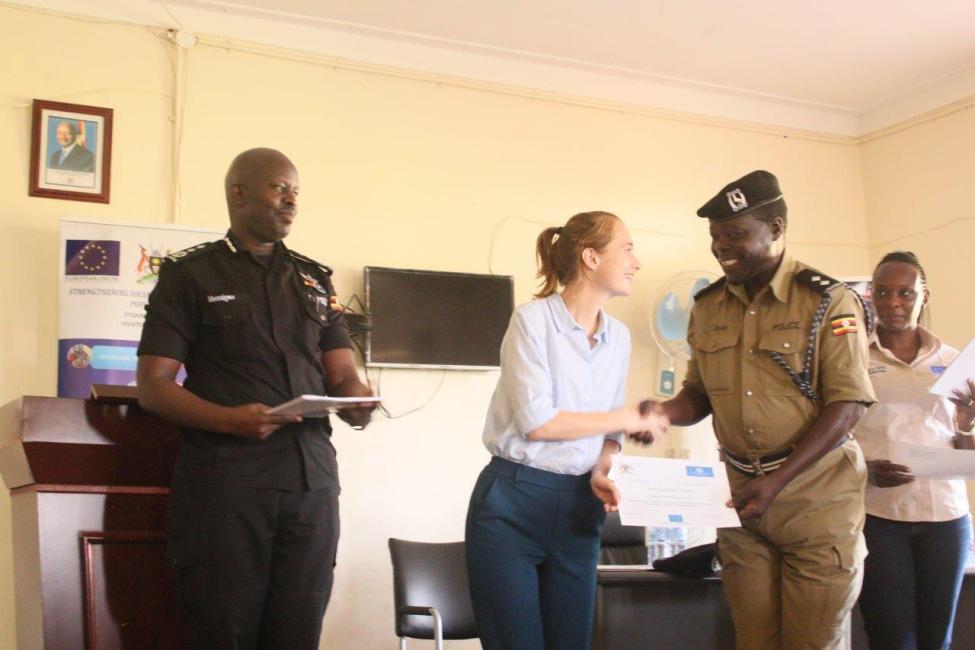-
Who We Are
WHO WE AREThe International Organization for Migration (IOM) is part of the United Nations System as the leading inter-governmental organization promoting since 1951 humane and orderly migration for the benefit of all, with 175 member states and a presence in over 100 countries. IOM has had a presence in Uganda since 1988.
About
About
IOM Global
IOM Global
-
Our Work
Our WorkAs the leading inter-governmental organization promoting since 1951 humane and orderly migration, IOM plays a key role to support the achievement of the 2030 Agenda through different areas of intervention that connect both humanitarian assistance and sustainable development. Across Uganda IOM supports the Government to address migration challenges and build the capacity of relevant stakeholders.
Cross-cutting (Global)
Cross-cutting (Global)
- Data and Resources
- Take Action
- 2030 Agenda
European Union, IOM train Senior Police Officers on Preventing Radicalization and Extremism
By Abubaker Mayemba
IOM and the Uganda Police Force have concluded a specialized training for senior Police officers, on prevention of Violent Extremism and Radicalization that can Lead to Terrorism (VERLT).
Premised on human rights-sensitive policing, the training was organized under IOM Uganda’s Strengthening Social Cohesion and Stability in Slum Populations (SSCoS) project, which is fully funded by the European Union.
Since 2017, the SSCoS project and the Police have organized several rounds of training, including Trainings of Trainers (ToT), on Community Policing (CP) with human rights-sensitive approaches. The trainings also aim at engaging security agencies to ensure that the drivers of radicalization and conflict affecting communities are understood and addressed in line with international best practices, in particular those developed through the Global Counter Terrorism Forum (GCTF).
The latest training was held at the Police Senior Command and Staff College at Bwebajja, in Wakiso district, and attended by 30 Police officers, including instructors. It was part of a broader initiative under which the Police will incorporate prevention of violent extremism into its standard police training curriculum.
On 15 November, the trainig was crowned by a joyous ceremony at the college, where the trainees were awarded certificates. The European Union Delegation to Uganda was represented by Ms Patricia Stephenson, the Task Manager for Preventing/Countering Violent Extremism, under the Governance and Human Rights section.
In her remarks, Stephenson noted that the SSCoS project represents a convergence of interests and aspirations of the people of Uganda on the one hand, and those of the European Union on the other. “The EU has been a strong and reliable partner for Uganda for many decades. We [too] want to see Uganda prosper. And this means that we want to see the youth of Uganda do well and prosper because Uganda is a very youthful country – 50% of the population being 15 years of age or younger.”
Hence, Stephenson added, young people in slums are being supported by SSCoS to get skills and capital to start or grow their small businesses. This is because without skills and opportunities, youth become vulnerable to radicalisation and being recruited into crime.
“But that is not enough to ensure peaceful, stable communities. Having a sensitive, engaged and effective Police force that respects citizens’ human rights is critical,” Stephenson said.
The Officer in charge the IOM Uganda Mission, Ms Erika De Bona Fofana, hailed both the funding from the European Union and the strong partnership with the Police. Besides the Police trainings, eight town hall meetings had been conducted in Kampala, Eastern Uganda, and Southern and Western Uganda; these engagements have enabled communities to dialogue with the Police to find solutions to common problems.
“We have together championed the Beera Clear campaign against violence on TV, on Radio, on line and in communities, including schools,” De Bona said. “Together, we are taking firm strides towards transforming the relationship between the Police and the people they are meant to protect and support.”
Commissioner of Police Frank Mwesigwa, who represented the Commandant of the Directorate of Counter Terrorism, said that the SSCoS project’s interventions are “spot-on”, since acts of violence are predominantly associated with socioeconomic factors characteristic of urban slum dwellers who are poor and at risk of being radicalized.
“As Police officers, it is critical that the manner in which we perform our duties; the way we relate with the public and the impression we give, goes a long way to either bring the communities closer to us or push them away. This is why awareness-raising must be taken to another level because it is through community policing that most of these problems are solved,” Mwesigwa said.
He urged that communities be engaged to address issues before they become full-blown problems, adding that once that is done, security agencies will get vital information beforehand: “Social Cohesion is very critical to us [security agencies]. Once embedded in curriculum, it will have a greater impact.”
The SSCoS project, which started in August 2016, is being implemented by IOM in the Kampala slums of Bwaise, Kisenyi, Katwe, and Kabalagala, together with partners that include the Action for Fundamental Change and Development (AFFCAD), ACTogether, and KiBO Foundation.
Among other achievements so far, 546 youths have graduated from vocational schools in Bwaise and Kisenyi, while 644 youths have received business start-up kits.
__________________________________
For more information / media enquiries, please contact IOM Uganda Public Information Officer, Richard M Kavuma. Email: ugandapiu@iom.int Tel +256 312 263 210.
